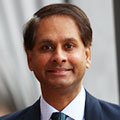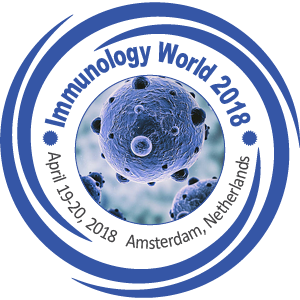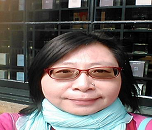Previous Speakers
Conference Information
Welcome Message

Dr.Ian Martins
1.Pulsus group would like to welcome you to 7th World Congress on Immunology (April 19-20, Amsterdam, Netherlands, 2018). It’s an exciting time for Immunology who are a world leader in Scientific events and the field of Immunology.
The world of international conferences is an exciting area to meet and bring inspired people together in forums like this and will provide the platform to meet global leaders in Immunology and relevant fields to hear their research at this exclusive scientific program. The Immunology Conference hosting presentations from editorial board members of prominent refereed journals, renowned and active investigators and decision makers in the field of Immunology. Immunology World 2018 Organizing Committee also invites Young investigators at every career stage to submit abstracts reporting their latest scientific findings in oral and poster sessions.
The International Conference is a place where we are always adaptable, motivated and responsive and focused to develop new ideas AT A TIME OF EXCESSIVE GLOBAL CHANGE.
2.This is the platform where you can exchange your ideas and learn novel concepts related to your field from the international speakers as well as the professionals participating in Immunology World 2018 to learn or share their experience and improve connections from the entire global community.
It is important to share knowledge with others due to newly generated problems. Pulsus could say that they create a golden opportunity for those people exposed to their knowledge through this Congress.
3.Immunology World 2018 continuously improve and understand knowledge by conducting various scientific sessions for example:
- Exclusive Sessions and Panel discussions on latest innovations in Immunology and Biomedical sciences
- Lectures by the active Investigators
- Keynote forums by Renowned Immunologists
- Speaker Forum
- Poster Sessions on latest Innovation in all the relevant Areas
- Open Innovation Challenges
- Poster Sessions on every career stage
- Young Research Forum
- Post-Doctoral Career Development Session
- B2B Meetings
4.I would like to thank each of you for attending Immunology World 2018 and bringing your expertise to GLOBAL ORGANIZATION. You, as organization leaders, have the vision, the knowledge, the excellence and the experience to help us pave THE way into the future.
INVITED SCIENTISTS should all be very proud of where they are today and excited about where they are to be headed with appreciation of support and leadership.
You are truly our greatest asset today and tomorrow with the release of cutting edge research and latest research innovations in the field of Immunology and biomedical sciences that has arrived from across the globe.
Throughout this INTERNATIONAL CONGRESS, I ask you to stay engaged, keep us proactive and help us shape the future of IMMUNOLOGY RESEARCH.
5.My personal respect and thanks goes out to all of you for your attendance at the 7th World Congress on Immunology (April 19-20, Amsterdam, Netherlands, 2018).
Yours sincerely,
Ian Martins (Ph D)
Fellow of International Agency for Standards and Ratings (IASR)
Centre of Excellence for Alzheimer's Disease Research and Care
Sarich Neuroscience Research Institute
Edith Cowan University
Australia
About Conference
Pulsus Group invites all the participants from all over the world to attend "7th World Congress on Immunology" (Immunology World 2018) on April 19-20, 2018 at Amsterdam, Netherlands. Conference includes prompt keynote presentations, Workshops, Oral talks, Poster presentations and Exhibitions.
Immunology conferences will gather people from academia, business and societies interested in immunology to share the latest trends and important issues relevant to immunology & related fields. Immunology World 2018 will provide the platform to meet global leaders in Immunology and relevant fields to hear their research at this exclusive scientific program. The Immunology Conference hosting presentations from editorial board members of prominent refereed journals, renowned and active investigators and decision makers in the field of Immunology. Immunology World 2018 Organizing Committee also invites Young investigators at every career stage to submit abstracts reporting their latest scientific findings in oral and poster sessions.
Why to attend?
Immunology conferences are leading annual immunology conferences happening around the world. Immunology world 2018, the two days of the congress will host 50 Scientific and technical sessions on cutting edge research and latest research innovations in the field of Immunology and biomedical sciences across the globe. The attendees can find
- Exclusive Sessions and Panel discussions on latest innovations in Immunology and Biomedical sciences
- Lectures by the active Investigators
- Keynote forums by Renowned Immunologists
- Speaker Forum
- Poster Sessions on latest Innovation in all the relevant Areas
- Open Innovation Challenges
- Poster Sessions on every career stage
- Young Research Forum
- Post-Doctoral Career Development Session
- B2B Meetings
- Global Networking with 50+ Countries
- Novel techniques to benefit your research
- Best platform for Global business and Networking opportunities
- Meet the editors of refereed journals, Society and Association members across the Globe
- Excellent platform to showcase the latest products in Immunology and affiliates
We wanted to let you know the Immunology conference, is happening soon. Sign up today and attend all two days that make up this exclusive conference. Don't miss this opportunity to hear the latest discoveries and networking opportunity with global experts.
Sessions and Tracks
Innate immune responses are not specific to a particular pathogen or non-self-ingredient in the way that the adaptive immune responses are. They depend on a group of proteins and phagocytic cells that recognize conserved features of pathogens and become quickly activated to help destroy invaders. The innate immune system is essentially made up of barriers that aim to keep viruses, bacteria, parasites, and other foreign particles out of your body or limit their ability to spread and move throughout the body.
- Defense Mechanisms
- General Immune Responses
- Phagocytes & Macrophages
- The Complement System
- Host-Pathogen Interactions
- Pathogen sensing and restriction
- Pathological inflammation in response to microbes
Regulation of T/B Cell Responses:
For immunomodulation and suppression of immune responses it needs regulation of immune cells. As Aberrant T/B cell responses developed wide range of diseases, including asthma and allergy and autoimmune diseases and many immunological disorders as T/B cells are the main route of the immune response ans its very important to regulate there function by different mechanism .
- Immune Regulator
- Interferon’s
- Signalling Pathways
- Suppression & Stabilization of T/B Cells
- Signaling Cascades (Cytokine Signals)
The adaptive immune system, also known as the acquired immune response which is more specific immune response then the innate immune response. Adaptive immune response is composed of highly specialized, systemic cells and processes that eliminate or prevent pathogen growth. It having ability to recognize specific pathogens more efficiently which creates immunological memory after an initial response to a specific pathogen and lead to an enhanced response to subsequent encounters with that same pathogen.
- Immunological memory
- Vaccine development
- Immune Responses: Primary and Secondary
- Germinal centres
- Affinity maturation & Selection
- Antibody - mediated immunity
Infectious Diseases and Immune System
Infectious diseases are disorders caused by organisms such as bacteria, viruses, fungi or parasites and immune system recognise them as non-self-antigen and produce immune response against them to protect our host cell from harmful infections.
- Pathogenesis
- Tropical infections
- Viral infections
- Surgical Site Infections
- Fungal infections
- Infections Prevention and Control
Immunological Basis for Immunization Disease:
The Immunological basis for immunization was initially developed in 1993 as a set of eight modules focusing on the vaccines included in the Expanded Programme on immunization (EPI). It’s the development of the Global Immunization Vision and Strategy of Immunization disease.
- Immunization, Vaccines and Biologicals
- Immunological Responses to Immunization
- Immunization Series
- Current Research on Immunization
- Global Immunization Vision and Strategy
Clinical immunology is the study of diseases caused by disorders of the immune system. It also involves diseases of other systems, where immune reactions play a part in the pathology and clinical features of immune response. In the Clinical immunology the molecular and cellular bases of immunological disease mostly studied.
- Immunodermatology
- Immunotoxicology
- Clinical Laboratory Immunology
- Immunological Disease
- Primary Immunodeficiency
- Neuroimmunology
Cellular Immunology is a broad area of in vitro and in vivo studies of cellular immune responses in the immune system. In the Cellular Immunology mostly study the mechanisms that regulate innate and adaptive functions of dendritic cells (DCs) during priming of T cells immunity on the cellular level.
- Diagnostic Immunology
- Immunomodulation
- Immunotherapeutics
- Cellular and Molecular Immunology Research
- Molecular & Cellular Immunology
Regional Immunology offers a new approach to communication in the field of immunology. The stated purpose of the journal is "to provide a focus for the judicious dissemination of results of experimental studies of immune activities as they are induced, expressed, and regulated in different regions of the body.
- Mucosal Immunology
- Immune Mechanisms
- Ocular Immunology
- Autoimmune disease
- Pediatric immunology
Transplantation is the act of transferring cells, tissues, or organs from one site to another in the living body. Most of the kidney, liver, heart, lung, or pancreas main organs transplant from a donor to recipient. But the immune system is the most formidable barrier to transplantation as a treatment. The immune system is developed very specifically and effectively to recognise foreign agents and self-antigen of the body, and this mechanisms are also involved in the rejection of transplanted organs of the body and reject the transplantation.
- Organ transplantation failure
- Hair Transplantation
- Pediatric Transplant
- Bone marrow Transplant
- Transplantation Technologies & Research
- Transplantation Rejection
Viral Immunology & Infection Control:
Viral Immunology delivers cutting-edge peer-reviewed research on emerging, rare, and under-studied viruses, with special focus on analyzing mutual relationships between external viruses and internal immunity. Active immunization involves administering a virus preparation that stimulates the body's immune system to produce its own specific immunity against virus.
Immunopathology and Immunodeficiencies:
The Immunopathology and Immunodeficiencies is innate and acquired immunity, passive and active immunization and immunopathologies, such as hypersensitivity reactions, autoimmunity and immunodeficiency and all disorders which cause by immune system.The Immunopathology is a branch of medicine that deals with immune responses associated with immunological disorders, and the Immunodeficiencies is immune system's ability to fight infectious disease get low or absent.
Microbial, Parasitic, and Fungal Immunology
Microbial, Parasitic, and Fungal Immunology is the study of the molecular and infection causing mechanisms used by microbes, Parasites & fungal but the Immune response show mechanism to destroy the infection as Immune system show specific immune response towards specific Infection. Microbes, Parasite, and Fungus which enters the body and triggers the development of an infection and cause damage to the host.
Market Analysis
Importance & Scope:
The infectious immunology market is segmented based on types of diseases into HIV, hepatitis, pneumonia, tuberculosis, malaria, inflammatory bowel diseases and autoimmune diseases. Approximately 5,00,000 deaths are estimated to be caused by rotavirus infection. HBV affected nearly 1.9 million in the U.S. in 2013. According to the journal published by BioMed Central, rotavirus infection the leading cause of severe dehydrating diarrhea among children worldwide. Every year rotavirus infection causes an estimated 111 million diarrhea episodes leading to 2 million hospitalization cases and 400,000 deaths of children under 5 years.
Therapeutics Market: Key Players
AbbVie
Johnson & Johnson
Amgen
Genentech/Roche
Astellas
UCB
Eli Lilly
Sanofi
AstraZeneca
Novartis
The market is expected to experience continued growth, from $61.5 billion in 2015 to $74.2 billion in 2022, at a compound annual growth rate of 2.71%.Immunology Market to 2022: From $61.5 Billion in 2015 to $74.2 Billion - Large Pipeline and Competitive Market to Drive Long-Term Market Growth. Global Immunology Market to 2022 is the Large pipeline and competitive market to drive long-term market growth




